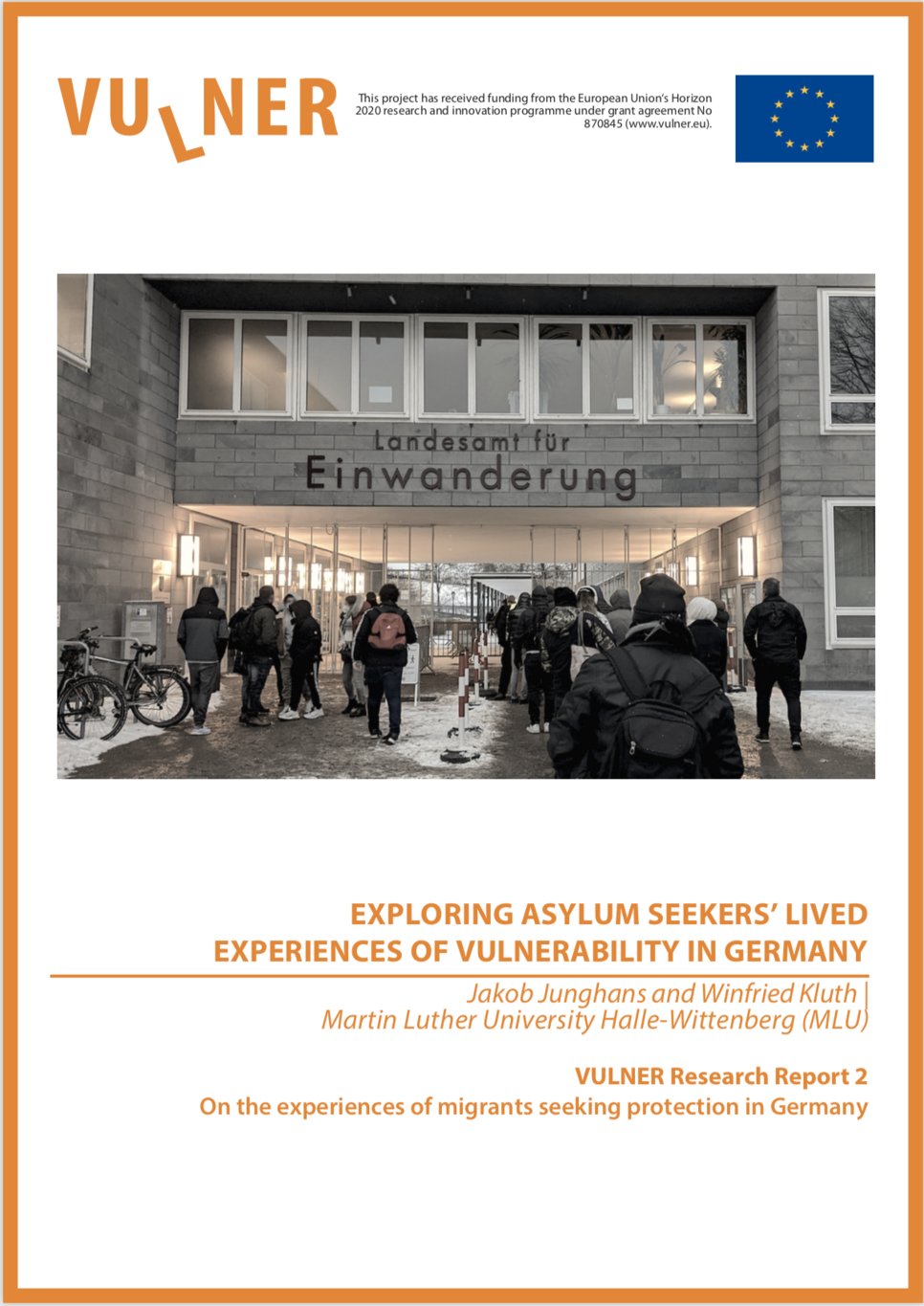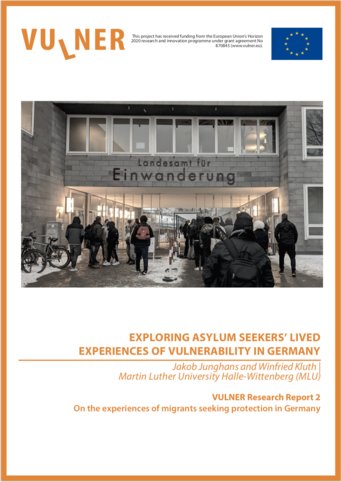EXPLORING ASYLUM SEEKERS’ LIVED EXPERIENCES OF VULNERABILITY IN GERMANY
VULNER Research Report 2
On the experiences of migrants seeking protection in Germany
This research report has been published as part of the EU Horizon 2020 VULNER research project (www.vulner.eu). The VULNER research project is an international research initiative with the objective to reach a more profound understanding of the experiences and vulnerabilities of migrants applying for asylum and other humanitarian protection statuses, and how they could best be addressed. This report therefore makes use of a twofold analysis, which contrasts the study of existing legal and bureaucratic norms and practices that seek to assess and address vulnerabilities among migrants seeking protection, with migrants’ own experiences.
Our first report examined the vulnerability assessment processes developed by state authorities in Germany, including how these processes are implemented on the ground through the practices of public servants.1 Due to the country’s federalist administration system, the German asylum procedure is uniformly regulated on the federal level (Bund) and the accommodation of asylum seekers is left to each German state (Land). The legal obligation to identify vulnerable asylum seekers is done on the federal level and by the German states and municipalities (Kommunen). Together they have to identify vulnerable individuals and address their special needs.

However, despite some efforts made to train decision-makers of the Federal Office for Migration and Refugees regarding issues pertinent to vulnerable asylum seekers or the introduction of protective measures to assess and address vulnerabilities in reception centres, our first research report found that Germany inconsistently implemented the European provisions towards vulnerable asylum seekers – as they are established in the EU Asylum Procedure and Reception Conditions Directives – which require the EU Member States to address the specific procedural and reception needs of vulnerable asylum seekers. The German federal Asylum Act only briefly mentions the obligation to identify vulnerable people and passes the responsibility to the German states (Länder). Consequently, the legal framework differs widely in each German state. Thus, vulnerability is only addressed in non-binding policy documents, administrative regulations, or protection plans against violence (Gewaltschutzkonzept). These definitions often merely address minimum standards, such as room occupancy in collective accommodations and gender-separated toilets. Whether and to what extent the special needs of vulnerable asylum seekers are considered thus depends primarily on the commitment of individuals in the respective administration, social service or counselling centre. So far, identification of vulnerable asylum seekers and needs-based support is not seen as an integral part of the asylum and reception procedure in Germany. Also, the federalist administration leads to unequal assistance for vulnerable people depending on the respective state and municipality they were distributed to.
For the second part of the research, we shifted the analytical perspective to the lived experiences of asylum seekers regarding the protection procedures, in order to shed light on the impact of the bureaucratic framework regarding vulnerabilities.
To that end, our research fieldwork included 28 interviews with asylum seekers during the period of March 2022 to January 2023. Additionally, our researchers made observations, and had informal interactions with some asylum seekers and other actors (NGOs, social workers, activists). To address the German federalism, we interviewed participants in various German states. The participants were at various stages of the asylum procedure and had different legal statuses.
The research findings are presented in three main chapters. The first chapter analyses, through a micro perspective, the personal circumstances of vulnerability. It demonstrates how compounded vulnerabilities arise out of the intersection of multiple factors to shape one’s experience of vulnerability. To this end, we first focus on specific individual vulnerability factors such as sexual orientation and gender identity, gender, mental and physical health and age, and then examine how these intersect with and are compounded by other individual circumstances or family and community factors. The experiences of the asylum seekers we interviewed revealed how greatly the different factors of vulnerability are interrelated. It was also possible to show why the categorisation of factors should not be strictly followed. Family and community factors in particular can change and merge over time. This is especially relevant for vulnerable groups who are also excluded from social networks because of their sexual identity, gender, or illnesses. The definitions and understanding of family and community are often different for asylum seekers than the definitions recognised and imposed by the state. When such recreated social bonds are not recognized and disrupted, by relocation for example, this can further increase a person’s vulnerability.
In the second chapter, we adopted a meso perspective and focussed on administrative and situational vulnerabilities which are caused by a precarious residence status and the dependence on state actors. Here we have identified structural factors of situational vulnerability such as legal techniques (an authority’s margin of discretion), or institutionalised spheres of mistrust created in interactions with authorities. We also looked at the negative impact of restrictions on freedom of movement on vulnerability experiences. In contrast, relationships with social workers, foster families and peers turned out to be important for creating a sphere of trust and for promoting asylum seekers’ agency.
In the third chapter, we took a macro perspective on how certain policy decisions can increase and/or decrease the vulnerabilities of asylum seekers. Due to German federalism, there are large differences in the municipalities that influence an asylum seeker’s situation. The type of accommodation and the municipal approach to integration determine much about an asylum seeker’s situation. But also, the federal policy instruments, which we looked at in relation to the Covid-19 pandemic and Ukrainian refugees, had a major impact. We have shown that uncertainty is a central feature of migration management-- both in terms of increasing informal regulatory approaches without binding and transparent regulations, and in terms of sanction mechanisms for illegalised residents who, however, cannot be deported. Having in mind that a safe place is the core aim for asylum seekers, the insecurity and uncertainty associated with the accommodation system is an essential part of the administrative vulnerability of asylum seekers in Germany.
Download the full report here.
